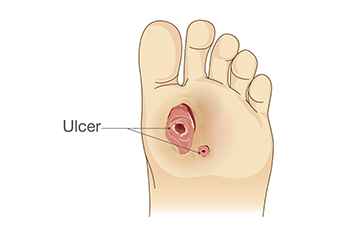
Non-diabetic foot ulcers are open sores or wounds that occur on the feet, typically due to poor circulation, pressure, or injury. Unlike diabetic ulcers, these wounds are not directly caused by high blood sugar levels, but can still lead to severe complications if left untreated. These ulcers often develop from pressure points on the feet, especially in individuals with limited mobility or poor blood flow. Risk factors include age, obesity, peripheral artery disease, and wearing ill-fitting shoes. Recognizing a foot ulcer early is important. Look for persistent redness, swelling, and an open sore that does not heal. To prevent these ulcers, regularly inspect your feet, wear appropriate footwear, and manage any underlying conditions that affect circulation. Treatment involves cleaning the wound, relieving pressure with specialized footwear, and possibly using topical medications. If you notice you have developed a foot ulcer, it is suggested that you visit a podiatrist who can assess the ulcer's severity, provide targeted treatments, and suggest preventive strategies to avoid recurrence, ensuring optimal foot health.
Wound care is an important part in dealing with diabetes. If you have diabetes and a foot wound or would like more information about wound care for diabetics, consult with one of our podiatrists from Pocono Foot & Ankle Consultants. our doctors will assess your condition and provide you with quality foot and ankle treatment.
What Is Wound Care?
Wound care is the practice of taking proper care of a wound. This can range from the smallest to the largest of wounds. While everyone can benefit from proper wound care, it is much more important for diabetics. Diabetics often suffer from poor blood circulation which causes wounds to heal much slower than they would in a non-diabetic.
What Is the Importance of Wound Care?
While it may not seem apparent with small ulcers on the foot, for diabetics, any size ulcer can become infected. Diabetics often also suffer from neuropathy, or nerve loss. This means they might not even feel when they have an ulcer on their foot. If the wound becomes severely infected, amputation may be necessary. Therefore, it is of the upmost importance to properly care for any and all foot wounds.
How to Care for Wounds
The best way to care for foot wounds is to prevent them. For diabetics, this means daily inspections of the feet for any signs of abnormalities or ulcers. It is also recommended to see a podiatrist several times a year for a foot inspection. If you do have an ulcer, run the wound under water to clear dirt from the wound; then apply antibiotic ointment to the wound and cover with a bandage. Bandages should be changed daily and keeping pressure off the wound is smart. It is advised to see a podiatrist, who can keep an eye on it.
If you have any questions, please feel free to contact our offices located in Stroudsburg, Nazareth, and Easton, PA . We offer the newest diagnostic and treatment technologies for all your foot care needs.
